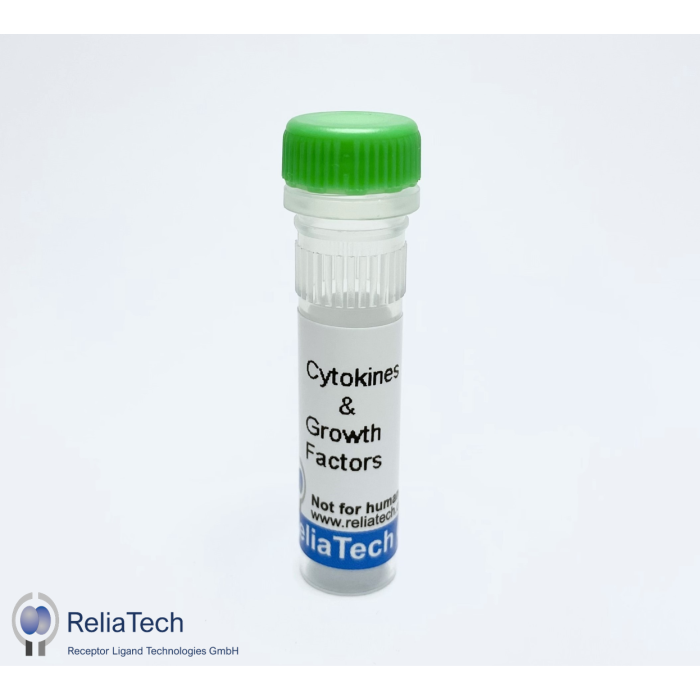Description / mouse HGF protein
HGF is a potent, mesenchymally-derived mitogen for mature parenchymal hepatocytes, and acts as a growth factor for a broad spectrum of tissues and cell types. HGF signals through a transmembrane tyrosine kinase receptor known as MET. Activities of HGF include the induction of cell proliferation, motility, morphogenesis, inhibition of cell growth, and enhancement of neuron survival. HGF is a crucial mitogen for liver regeneration processes, especially after partial hepatectomy and other liver injuries. Human and murine HGF are cross-reactive. Murine HGF is expressed as a linear, polypeptide-precursor glycoprotein containing 696 amino acid residues. Proteolytic processing of this precursor generates the biologically active heterodimeric form of HGF, which consists of two polypeptide chains (α-chain and β-chain) held together by a single disulfide bond resulting in formation of a biologically active heterodimer. The α-chain consists of 463 amino acid residues and four kringle domains. The β-chain consists of 233 amino acid residues. Recombinant Murine HGF is a 79.3 kDa polypeptide consisting of 696 amino acid residues.
More Information
| Size | 20 µg |
|---|---|
| Source | Insect cells |
| Biological Activity | Determined by the dose-dependent stimulation of the proliferation of mouse IMCD3 cells using a concentration range of 10-20 ng/ml. |
| Purity Confirmation | > 95% by SDS-PAGE & HPLC analyses |
| Length [aa] | 696 |
| Molecular Weight | 79.3 kDa |
| Species Reactivity | Mouse |
| Formulation | lyophilized |
| Buffer | 10mM Tris, pH 7.2 + 100mM L-Arginine + 200mM NaCl |
| Protein Sequence | ALPHA CHAIN: QKKRRNTLHE FKKSAKTTLT KEDPLLKIKT KKVNSADECA NRCIRNRGFT FTCKAFVFDK SRKRCYWYPF NSMSSGVKKG FGHEFDLYEN KDYIRNCIIG KGGSYKGTVS ITKSGIKCQP WNSMIPHEHS FLPSSYRGKD LQENYCRNPR GEEGGPWCFT SNPEVRYEVC DIPQCSEVEC MTCNGESYRG PMDHTESGKT CQRWDQQTPH RHKFLPERYP |
| Reconstitution | Centrifuge the vial prior to opening. Reconstitute in water to a concentration of 0.1-1.0 mg/ml (Note: Slow to dissolve). Do not vortex. This solution can be stored at 2-8°C for up to 1 week. For extended storage, it is recommended to further dilute in a |
| Stability and Storage | The lyophilized protein is stable at room temperature for 1 month and at 4°C for 6 months. Reconstituted working aliquots are stable for 1 week at 2°C to 8°C and for 3 months at -20°C to -80°C. |
| Synonyms | Hgf; NK1; NK2; HGF/SF; SF/HGF; C230052L06Rik |
| Uniprot ID | Q08048 |
| Protein RefSeq | NP_034557.3 |
| mRNA RefSeq | NM_010427.4 |

